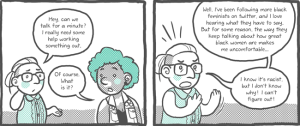As a feminist writer, my inbox is jam-packed with questions and comments about the work that I do.
And as much as I love to open up a respectful and passionate dialogue about feminism and its merits, I find that the e-mails start to get repetitive.
After the hundredth message about how I should be a humanist instead of a feminist, I feel like punching my computer screen. Really.
I don’t want to shut down the conversation. On the contrary! I want us to be able to have a meaningful conversation about social justice.
But sometimes the way that people approach me can be a little off-putting. It can sound more like “Defend your ridiculous beliefs so I can disagree with you” instead of “I want to have a conversation with you, and I’m interested in your perspective.”
Maybe you’ve tried to chat with a feminist, only to find we’re putting up a wall. You might have asked a question, only to find that we’re rolling our eyes and dismissing you.
But what you have to understand is that it comes from a place of encountering the same misconceptions over, and over, and over again. And that is just exhausting.
So before you tweet that famous activist or send an e-mail to that feminist blogger, peruse this list and see if maybe a simple reframing of your statement might make all the difference.
1. Can You Teach Me? Otherwise, I’ll Never Learn
My biggest pet peeve is when people come to me, expecting that I’ll take the time to educate them about an issue that they don’t know about.
As much as I’d like to do this for each and every person that approaches me, the reality is that I don’t have the energy, the time, nor is it my responsibility to inform each and every person that wants me to.
It’s especially frustrating because when people ask me to educate them, they seldom have made an attempt to educate themselves.
If the only way you think you’ll learn about feminism is by harassing me on Twitter, you should refamiliarize yourself with Google.
Proving that we are oppressed is not the responsibility of the folks who are already facing oppression.
Maybe you’re asking because you respect me, find me interesting, or want my perspective in particular. If that’s the case, show me that you’re coming into this with a commitment to learn and that you value my time and energy.
Instead, seek out articles, books, and resources online about feminism on your own time. Express a genuine interest in doing the work yourself.
Perhaps you can say, “I heard bell hooks is a great feminist writer. Do you have a favorite by her?” or “Everyday Feminism seems like a great site. Would you recommend it?” (The answer, by the way, is yes.)
But please, if we don’t respond, move on. Don’t harass someone just because they don’t feel like taking on the burden of being an educator.
2. Why Call Yourself a Feminist? That’s Exclusive. You Should Call Yourself a Humanist or Equalist Or…
Lucky you! Everyday Feminism already has a quick article on this very topic!
The short answer? Because I believe that a movement that acknowledges that some genders are marginalized more than others, and focuses in on the systemic forces that make it so, is more grounded in the reality of our lives.
There is nothing inherently bad about being specific, especially when inequality does not impact everyone the same way.
I imagine that when you ask this question, what you’re really trying to understand is why we have chosen to focus on feminism when there seem to be other options.
So rather than telling us how we should identify, maybe give us a chance to tell you what feminism means to us.
Instead, ask us why feminism is important to us – and pay attention to our answer.
3. What About the Men? Why Isn’t Feminism Concerned About Men?
Well, we are.
Feminists have written extensively on the impact that sexism has on men, and many of the issues we fight for are issues that men have a stake in as well.
But a cause does not need to include men to be a worthwhile issue to tackle, just like saving one endangered species (like pandas) does not need to include flamingos to be important.
Addressing the inequalities that women or other marginalized folks face is important in itself and does not need to include men to be a worthwhile cause.
When you say “what about men” each time we’re trying to address a problem, it starts to feel like you believe the lives and struggles of men outweigh the struggles of other marginalized folks in comparison – which, um, is exactly why we need some focus on gender minorities.
Contrary to popular belief, being against sexism does not mean you hate men.
Instead, don’t derail the conversation. Listen to feminists when they talk about the causes that matter to them.
Be mindful of the privilege that you have that might compel you to prioritize the concerns of men over other genders.
And if there’s a cause that you are passionate about, organize and do something about it!
“I’m trying to form a support group for male survivors of sexual assault,” you might say. “Do you know any organizations that might be able to help?”
You may find that feminists are some of your best allies.
4. You’re So Critical of Everything! Can’t You Just Relax and Enjoy This [Insert Media]?
I want to get real for a second here.
As a non-binary and transgender person, I am hard-pressed to turn on the television, open a book, play a game, or watch a film that has any sort of positive portrayal of my community.
It’s difficult to find any kind of media that is a reflection of the reality I am living – something that validates that people like me exist, and that we lead dynamic and complicated lives.
I’m critical of this not because I’m looking for something to be upset about, but because I’m immersed in a society that erases me. I only hear about people like me when they’re being killed or being banned from bathrooms.
I’m critical because living in a society that does not validate my existence is painful.
Feminists are often critical of the media because it reflects something deeper about the society we are a part of.
The glorification of violence against women in video games, for example, reflects a deeper problem with misogynistic violence in our society.
The lack of queer people in films points to a greater problem with queer lives being erased, ignored, and sensationalized in society at large.
The lack of positive representations of people of color can deeply impact the ways that young children of color see themselves.
So yes, it’s kind of awful to tell us we’re “too critical” when that criticism comes from a place of concern, anger, and pain.
But if critiques are overwhelming or too heavy to talk about, let me suggest an alternative.
Instead, ask about what media we do enjoy – and ask why.
Positive representations might give you better insight into what we’re looking for in the media we consume. Give us an opportunity to geek out about the stuff we like, and you may find that we have something in common after all.
5. Is Feminism Even Really Necessary Anymore?
Imagine, if you will, a time that you worked incredibly hard on something. Maybe it’s an Eiffel Tower made of toothpicks, and it took hundreds of hours to construct.
Now imagine if I came up to your Eiffel Tower of toothpicks, knocked it over and said, “You wasted your time.”
I would be an ass. You would be angry with me. And that would be justified.
Telling feminists that something they passionately believe in is unnecessary invalidates the enormous amount of work that we’ve been doing.
Maybe from your perspective, you’ve not encountered the adversity that feminists have described. But many people still experience inequality, and it’s not a secret. Marginalized folks have been writing, speaking, and protesting for decades.
Instead of invalidating our struggles, ask what led to us identifying as a feminist. “Why are you a feminist?” you might ask. “What sorts of causes are you passionate about?”
Make an effort to learn about what circumstances and struggles might lead someone to identify with feminism.
And remember that just because you haven’t personally experienced what they’re describing, it does not mean it doesn’t exist.
***
I wish the folks who e-mailed or tweeted me realized that, behind the online persona, I’m a human being.
I think it’s worth remembering that golden rule: Treat others the way you want to be treated.
I love having conversations about feminism and equality – yes, really! – but only if the person I’m having that conversation with is willing to do their homework, respects my perspective, and understands that our experiences may be different.
Remember: No one is obligated to converse with you.
We have our inboxes flooded with messages like yours all the time. We are not required to entertain you or debate with you if we don’t want to, especially when so many resources on the Internet exist that could just as easily answer your question.
Similarly, if someone with a boom box came up to you and demanded that you have a rap battle, or someone shoved a sandwich in your face and demanded that you eat it, there is no law that says you must oblige.
But if you approach us respectfully and you frame your comments in a way that is engaging, we may just surprise you.
[do_widget id=”text-101″]
Sam Dylan Finch a Contributing Writer for Everyday Feminism. He is queer writer, activist, and educator based in the San Francisco Bay Area. In addition to his work at Everyday Feminism, he is also the founder of Let’s Queer Things Up!, his hella queer and very awesome blog. You can learn more about him here and read his articles here. Follow him on Twitter @samdylanfinch.
Search our 3000+ articles!
Read our articles about:
Our online racial justice training
Used by hundreds of universities, non-profits, and businesses.
Click to learn more





















